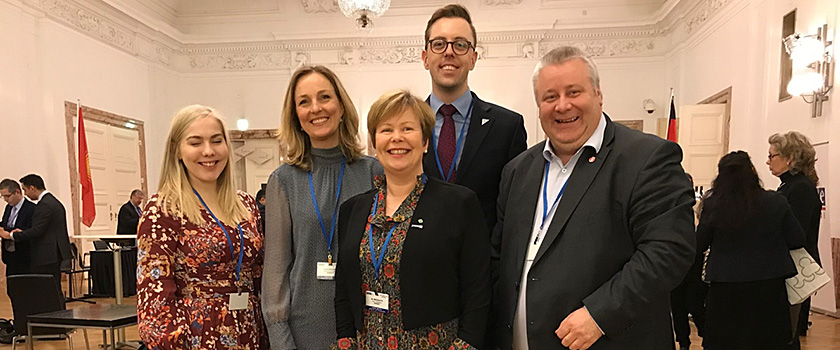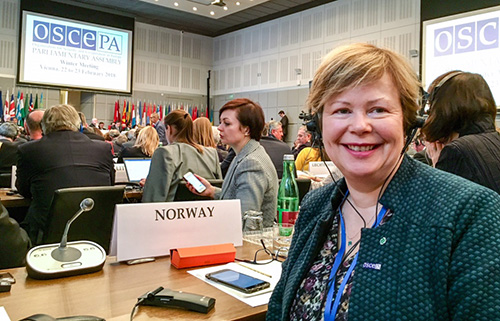
The Storting’s delegation to OSCE PA’s Winter Meeting consisted of Mari Holm Lønseth, Torill Eidsheim, Siv Mossleth, Nicholas Wilkinson, Bård Hoksrud and Kari Henriksen (absent when the photo was taken). Photo: Storting.
Time for dialogue, hope for a thaw
“Fake news”, climate change, arms control, migration and international terrorism were on the agenda at the OSCE Parliamentary Assembly’s Winter Meeting on 22–23 February.
Six participants from Norway were among 240 members of parliament from 53 countries attending the OSCE’s Parliamentary Assembly’s 17th Winter Meeting in Vienna on 22–23 February. A key theme of the meeting was the need for improved dialogue and confidence-building at a time of increased international tension.
“Participation by Norwegian parliamentarians is important. In the current climate of heightened international tension, we see a need to improve dialogue among the countries in the OSCE region,” says Siv Mossleth (Centre Party), who headed the Storting’s delegation.

Siv Mossleth (Centre Party), head of the delegation. Photo: Storting.
Détente, confidence-building and dialogue
The President of the Parliamentary Assembly, Georg Tsereteli (Georgia), called for less focus on deterrence and more on easing tensions, confidence-building measures and strengthened dialogue in a period marked by great security challenges. The OSCE (Organization for Security and Co-operation in Europe) Parliamentary Assembly has three general committees that focus respectively on political affairs and security; economic affairs, science, technology and the environment; and democracy, human rights and humanitarian matters.
The General Committee on Democracy, Human Rights and Humanitarian Questions discussed “fake news” and ways to differentiate between fake news and mere poor journalism. How to respond to fake news without compromising freedom of expression was another topic.
“Education and developing critical thinking in young people are important if fake news is to be identified for what it is. Having an independent and credible press is also important,” says Siv Mossleth, who, along with Kari Henriksen (Labour Party), represented Norway on the committee.
Bård Hoksrud (Progress Party) and Nicholas Wilkinson (Socialist Left Party) took part in the General Committee on Political Affairs and Security.
“The situation in the Crimea and eastern Ukraine is serious,” says Mr Hoksrud. “It became the focus of much of the committee’s debate, and there is a fear of more conflict to come.”
“A number of European countries advocated disarmament and banning nuclear weapons, but Russia and the US say no,” Mr Wilkinson adds.
Torill Eidsheim (Conservative Party) and Mari Holm Lønseth (Conservative Party) sat on the General Committee on Economic Affairs, Science, Technology and the Environment. Discussion there centred on shared climate challenges as well as energy, water and migration, with emphasis on how such challenges will affect economic development and security.
“Several member countries pointed to the need to unify efforts. They are ready to help develop a more sustainable society, but this requires defining a clear, shared goal,” Ms Eidsheim says.
Abid Q. Raja, Fifth Vice President of the Storting, was invited to the closing plenary meeting in Vienna and the Assembly’s debate on international terrorism. Mr Raja commented on the struggle against violent extremism and radicalisation.
Facts on OSCE Parliamentary Assembly (OSCE PA)
The OSCE does important work in areas such as conflict prevention, democracy development and human rights. It has member countries in Europe, Central Asia and North America.
The key tasks of the OSCE PA are to evaluate the efforts and achievements of the OSCE, issue recommendations to governments and debate topical matters related to the organisation. The Parliamentary Assembly also helps foster interparliamentary dialogue and cooperation while supporting the OSCE’s work on conflict management and further developing democratic institutions in the member countries.
The Parliamentary Assembly plays an important role in observing elections and cooperates with the OSCE’s Office for Democratic Institutions and Human Rights (ODIHR). Election observation assignments are a concrete contribution to democratic development.
Last updated: 28.02.2018 09:58